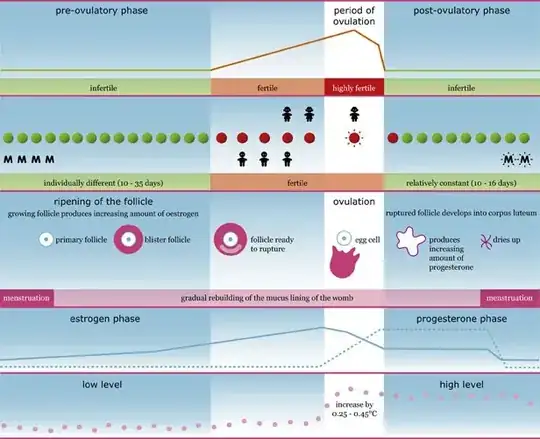Short answer:
The odds of her being pregnant are non-zero but negligible given that the sex was non-penetrative. The vagina is an acidic environment that's quite hostile to sperm so even if some swam inside they would likely die well before reaching the cervix. It's quite a journey for the sperm even in the best of times.
Long answer:
I'm not a doctor but I have been practising fertility awareness methods for over 4 years.
First, drop the calendar. It's not 'the day of the month' that determines whether or not you are fertile but rather how close to ovulation you are.
The day before ovulation is the best time to try to get pregnant: https://academic.oup.com/humrep/article/14/7/1835/2913179
Two days before also has a good chance to become pregnant. There are generally 6 fertile days per cycle: 5 days before and 1 day after.
A woman can ovulate on different days per cycle. In my own charts, I've seen ovulation occur anywhere from CD12 to CD18. Luckily, the female body begins to excrete cervical mucus around 6-9 days before ovulation in this pattern: dry, sticky, creamy, egg white. Egg white mucus comes directly before ovulation (4+ days) and dries up after. You can further pinpoint ovulation using an OPK kit, cervical position monitoring, basal body temperature.
So you cannot know the probability of getting pregnant on a given day without knowing the day you ovulated. Once the egg has dissolved you cannot get pregnant from that moment until the next menstrual cycle.
You can read more about fertility awareness here: https://en.wikipedia.org/wiki/Fertility_awareness
NFP can be very effective if done properly and there are no side effects!
https://www.sciencedaily.com/releases/2007/02/070221065200.htm
Please don't start using it unless you have taken classes with a practitioner first.
I really don't recommend that a woman should take oral contraceptives. I am a woman by the way.
https://www.ncbi.nlm.nih.gov/pubmed/?term=ORAL+CONTRACEPTIVES+AND+MOOD%2FSEXUAL+DISORDERS+IN+WOMEN
https://www.ncbi.nlm.nih.gov/pubmed/24014598
Increased risk of depression, sexual dysfunction, breast cancer, nutritional deficiencies!
